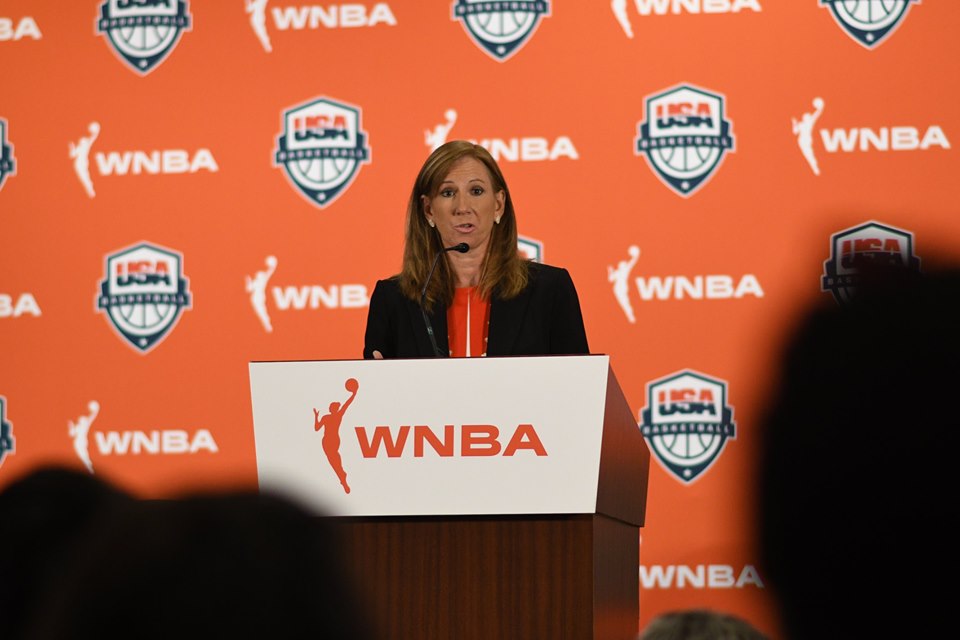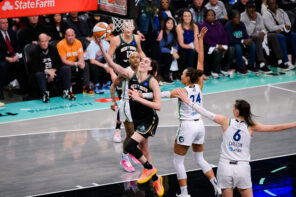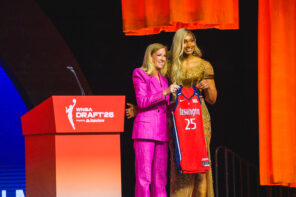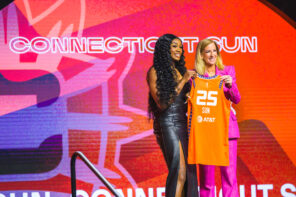It is an understatement to say that WNBA commissioner Cathy Engelbert has been making her fair share of rounds since taking the reins with the league’s top job.
One of those latest stops came in Washington, D.C. – home of the W’s defending champion Mystics and site of a luncheon that occurred at the National Press Club where Mystics owner Ted Leonsis as well as other Washington personnel – including Ariel Atkins and coach Mike Thibault were also in attendance. Sheila Johnson, a Mystics co-owner, who according to a Washington Post report is interested in leasing one of the president’s hotels in D.C. was also in attendance.
Engelbert opened her remarks by saying that it all began with a call she received that the NBA was looking for, what she described as, a “female business leader with a passion for the game.”
Originally, I didn’t think I’d ever be the commissioner of the WNBA, but I looked at the challenges of the players opting out of the collective bargaining agreement and I’ve never been one to shy away from challenges.
–Cathy Engelbert (National Press Club)
Engelbert mentioned that other jobs peaked her interest as well, but one thing that made the WNBA job so enticing was bringing her back to her basketball roots, mentioning that her father was a Detroit Pistons draftee in the 1950s.
NPC President Michael Freedman moderated the panel. Leonsis opened by mentioning the responsibility Monumental Sports and Entertainment feels it has in owning teams, particularly with ensuring its ownership structure reflects the diversity people want to see.
I believe the social responsibility in owning teams – we punch way above our weight. And we have to be true exemplars to not only our community, but to the industry at large.
–Ted Leonsis, Washington Mystics owner (National Press Club)
Engelbert then spoke about if there were any differences between being a commissioner and being a president, which previously was the top title the WNBA’s four previous leaders (Val Ackerman, Donna Orender, Laurel Richie, Lisa Borders) had. She reiterated as she has before that she is not big into titles and that her previous role involved much attention to issues many in Washington, D.C., ironically, are already focused on such as finances and taxes.
The main thing she emphasized is that success is all based on relationships – whether at Deloitte or within the W. Engelbert mentioned that she was an employee-first CEO in the accounting world and brought that with her to the WNBA by way of a player-friendly approach, which was crystallized in the CBA that was struck between the league and the WNBPA.
She talked about a phone call she had with NBA commissioner Adam Silver where the plan was to make Engelbert a commissioner instead of a president because it solidified the WNBA’s standing as a major sports league. Leonsis then spoke about Engelbert’s title.
Commissioners are way more important than presidents and CEOs and, frankly, owners. Because their focus is to do what’s in the best interest of the game. And the game is the players, the employees, the fans, the community and they have to be empowered to be able to take the big picture and say, ‘How am I going to build value for all of those communities?’
–Ted Leonsis, Washington Mystics owner (National Press Club)
Leonsis highlighted a key element of Engelbert’s job – previous presidents had to report to the NBA commissioner whether that was Silver or the late David Stern. That is not the case with Engelbert.
Freedman then asked her about what she has experienced on her job, thus far. Engelbert, shortly after becoming commissioner, visited all 12 WNBA markets and was astonished by how much rapid change there was despite the WNBA being a small league of only 12 teams.
According to Engelbert, the league’s size is an advantage and a disadvantage. It served as an advantage to her because it gave her a clear vision on where she believed the league could be with the new collective bargaining agreement. It was a disadvantage because it limits the WNBA’s potential reach.
We don’t have a team in the Bay Area. When technology’s driving so much of your economy and you don’t have a team in the tech center of your country … that’s a disadvantage.
–Cathy Engelbert, WNBA commissioner (National Press Club)
What shocked Engelbert upon taking the job was the statistic she heard about less than one percent of corporate sponsorship dollars going to women’s sports – and only four percent of mainstream media coverage being dedicated to women’s sports. What she did want to distinguish is not only the disparity between attention paid to men’s sports and women’s sports, but women’s individual sports and women’s team sports.
I’ve, kind of, followed tennis and followed individual sports and individual … sports for women actually get decent coverage, but team sports get very little coverage.
–Cathy Engelbert, WNBA commissioner (National Press Club)
Engelbert said an asset can be the wave of women’s empowerment that has been seen in many avenues of society. It is fitting that the panel took place in March – Women’s History Month. Freedman then asked both Leonsis and Engelbert by those standards how success for the WNBA can be measured.
From (an) ownership standpoint, it has to be on does your team have value. Does it matter to the fans, does it matter to the community and economically, will you over the long term see accretion in the money that you put in, will it be worth more 10 years, 20 years, 30 years from now. To be sincere, to date, that hasn’t happened. And that’s why I think we reached this existential moment in development and we needed a new leader and a new viewpoint.
–Ted Leonsis, Washington Mystics owner (National Press Club)
Leonsis made mention of long it took for the New York Liberty to be sold from James Dolan and Madison Square Garden to Joe Tsai’s investment group as well as how hard teams have to press local and national media outlets to garner the coverage Engelbert and others within the WNBA ecosystem are in search of.
Leonsis praised ESPN, CBS and other WNBA television partners in expanding the league’s reach through media coverage, but acknowledged more had to be done on a local and national level. He stressed that the metrics he looks at – importance, selling out arenas and media coverage matter in the short term and if those things can be accomplished in the long term then value builds.
If you’re in this for the short haul, this is not a good place to be. You have to have partners, fellow owners that really believe in, kind of, the overall righteousness of the model.
–Ted Leonsis, Washington Mystics owner (National Press Club)
For us not to be supporting, in the same way, women’s sports as we do men’s sports is bad business. It’s not just the wrong thing to do as a dad or a leader, it makes no economic sense.
–Ted Leonsis, Washington Mystics owner (National Press Club)
Leonsis believes building value is the key to the WNBA’s other aspirations – including expansion to new cities. He also wanted to stress one thing about the W that others within its press corps have mentioned when discussing if the WNBA is a success or not – that it is only 24 years old and that it took larger leagues such as the NBA decades to ascend to where they ascended to.
We’re probably ahead, historically, in our development, our fan avidity, our reach than the NBA was after 23 years. And so…if you take, kind of, the 40,000 foot view, we’re kind of happy with where we are.
–Ted Leonsis, Washington Mystics owner (National Press Club)
Leonsis mentioned that bringing Engelbert on board is the sign of a changing mindset in regards to the league that it will begin to flex its financial muscle. Engelbert also reminded people that the NBA Finals were on tape delay 40 years into its existence. Then Larry Bird, Magic Johnson and Michael Jordan happened and the rest for the NBA is history.
I tell my team, if it’s not a player-impactful program that we’re transforming (in) this league, don’t bring it to me.
–Cathy Engelbert, WNBA commissioner (National Press Club)
Engelbert mentioned that a challenge for the WNBA and its 12 teams is when their value is measured that it is put through a man’s lens and a male model. She challenged companies that use this metric on the WNBA to think an investment in the league as one in women in an economy where women make most of a household’s decisions and one that features elite athletes who are marketable and socially conscious.
We have one of the best players in the WNBA, Maya Moore, taking her second year off working on prison reform. And working on, kind of, a social justice. We have Natasha Cloud here in this market who works on gun control reform.
–Cathy Engelbert, WNBA commissioner (National Press Club)
No spreadsheet ever yielded a good answer for the WNBA, or for women for that matter.
–Cathy Engelbert, WNBA commissioner (National Press Club)
Freedman later turned the conversation to two major losses the basketball world had lost just recently in David Stern and Kobe Bryant, who both were influential, in their own ways in supporting women’s basketball.
Stern, of course, is credited with the WNBA’s creation in 1997 and Bryant was one of the biggest advocates for women’s basketball.
David Stern really was the godfather of the WNBA.
–Ted Leonsis, Washington Mystics owner (National Press Club)
Leonsis says the vision Stern had for the WNBA has been enhanced by the work Silver has done since assuming Stern’s prior role.
Basketball is the most beautiful game, it is the ascendant sport, we have the greatest athletes and we want to have year-round programming. That’s how I look at it as head of the media committee.
–Ted Leonsis, Washington Mystics owner (National Press Club)
Leonsis sees his pitch to networks as making basketball a 12-month sport between the WNBA, NBA, G-League and 2K League. He also reiterated an earlier point by Engelbert that the absence of a team in the Bay Area is a “strategic hole” for the WNBA. He said a strategy is to use the infrastructure created by the NBA to introduce the WNBA into more markets such as the San Francisco Bay Area.
Engelbert mentioned the momentum that was created for a creation of a WNBA after the 1996 Olympics in Atlanta – and that this year’s USA Basketball Women’s National Team was aiming for a seventh consecutive gold medal after successfully winning gold in 1996, 2000 in Sydney, 2004 in Athens, 2008 in Beijing, 2012 in London and 2016 in Rio de Janeiro.
She then talked about the late Kobe Bryant in which she mentioned that the first three speakers at his memorial service at Staples Center were all from the realm of women’s basketball. Those three were Diana Taurasi, Sabrina Ionescu and Geno Auriemma.
I didn’t even realize how much he was mentoring our WNBA players and college players … girls basketball college players. And Adam at the NBA All-Star weekend in Chicago, told a story about, he was in China with Kobe back in, I guess it was, back late last summer – August. And Kobe said, ‘I don’t want to talk about the NBA. I want to talk about the WNBA and I want to meet the new commissioner.’
–Cathy Engelbert, WNBA commissioner (National Press Club)
She said when he had a meeting with her in New York, he remarked about spending hours on girls’ basketball – and loving it. He was curious as to how Engelbert planned to accomplish these objectives.
Engelbert also said that said advocacy role has also been of interest to NBA players and that they are ready to fill said role in his stead.
There’s no doubt that Vanessa Bryant, putting together that memorial service was looking for women’s basketball and the WNBA to be front and center.
–Cathy Engelbert, WNBA commissioner (National Press Club)
What Leonsis said he would remember about Kobe Bryant is how someone of his stature could see someone such as Elena Delle Donne playing against the elite talents of the NBA – and meaning it as a compliment.
Freedman then shifted the panel conversation to the upcoming Tokyo 2020 Olympics and if that poses any challenges for the league. She said that while taking a month off is a disadvantage, it also creates an opportunity to use the Olympics as a springboard for the latter portion of the season. She then mentioned how this was an inspiration for the Commissioner’s Cup (set for Aug. 14), a byproduct of the new CBA.
Engelbert then said that the success of last year’s United States Women’s National Team that won the Women’s World Cup could be a guide for what the WNBA hopes to accomplish. The only difference is, as she mentioned is that there is a WNBA season every year where the World Cup and Olympics are every four years. The W’s challenge, she says, is finding a model that works year in and year out.
Leonsis said that the WNBA-Olympics relationship works because women’s sports needs all the exposure that it can get. Also – even though he did not mention this – many WNBA players also play overseas, so they are used to the competition, the venues and the players.
But he talked about how he and other owners are also protecting their investments when it comes to the NBA and NHL and that their relationship with the International Olympic Committee could be more contingent in the future on what leagues get out of sending their players to play internationally.
Engelbert and Leonsis then were asked about the one thing that is on everyone’s mind nowadays – the coronavirus. There have been increased concerns about how the disease, now described by the World Health Organization as a pandemic, could affect the 2020 WNBA season.
Numerous sporting events have either been canceled or rescheduled and leagues have even flirted with the idea of playing games in front of no fans to stop the coronavirus from spreading.
While the WNBA is in its offseason, Engelbert did say the league is monitoring the developments particularly with players beginning to conclude their overseas play and with more WNBA events coming up in the coming months – including the draft.
About that draft – Engelbert also said that this year’s draft in New York would be available to fans for the first time since the 2016 draft at Uncasville’s Mohegan Sun Arena.
She then was asked by Freedman about what the base of the WNBA could be. Ask that question to anyone and they may say that it is women, but as W insiders and fans know, the league has actually struggled more with women than men to draw up interest.
Having full arenas is really important. It’s important for the look on TV. It’s important to the players to have that – those fans have an experience so they come back. That’s why what Ted has done here in Washington in selling out the arena … is really interesting. It’s a smaller arena, but, you know, the fan experience for Game 5, the deciding game in the WNBA Finals was amazing. I was there.
–Cathy Engelbert, WNBA commissioner (National Press Club)
Engelbert says that the league hopes to attract a more diverse fanbase ala the NBA. One area of the WNBA’s existing fanbase it wants to tap into more after the tragic deaths of the Bryants, she said, is the father-daughter #GirlDad crowd.
I have people come up to me who have daughters – men – that I used to work with at Deloitte who have daughters and say, ‘I want the first basketball – professional basketball game my daughter goes to to be the WNBA, not the NBA because I want her to see the role models of the WNBA players.
–Cathy Engelbert, WNBA commissioner (National Press Club)
Other potential fanbases were mentioned too – including young people who grew up with digital media. She also made sure to mention that a complaint she typically gets is why there is not enough WNBA merchandise. That is a stark contrast to where she was at Deloitte where merchandise was not even on her list of priorities.
Kobe Bryant, when he came into the NBA-WNBA offices, we gave him a swag bag, that’s what you do in sports. And we gave him this orange hoodie with the WNBA logo on it … one of the last pictures of he and GiGi were courtside at a Lakers game and he wore the orange hoodie I gave him.
–Cathy Engelbert, WNBA commissioner (National Press Club)
Leonsis praised the W for being ahead of MLB and the NFL in terms of marketing because the WNBA’s marketing efforts as a progressive, forward-thinking league with socially conscious players. He said it particularly helps that large cities such as Washington, D.C. and New York City are where teams are based given that young professionals are choosing to move to urban areas such as those.
His ensuing words could have been seen as a marketing pitch for some of his players.
We talked about Ariel who’s here and I said she’s like a walking poster child for everything that a marketer would want to be associated with. Attractive, healthy, educated, progressive, socially committed … that’s who you want to be connected with .. and a champion, world-class … and global – plays internationally.
–Ted Leonsis, Washington Mystics owner (National Press Club)
Leonsis also mentioned how the WNBA Finals MVP was an international player – Belgium’s Emma Meesseman and compared it to how the NBA’s regular season MVP is international as well – the Milwaukee Bucks’ Giannis Antetokounmpo – the Greek Freak.
He believes that while the “traditional media” as he put it has got it right on the WNBA – and that digital platforms such as Apple, Amazon and Twitch could be not too far behind.
We have to have that unpaid media, the editorial side going up on respect and I think we’ll start to see that as the media changes from being, well, I only want to talk about football, I only want to talk about baseball.
–Ted Leonsis, Washington Mystics owner (National Press Club)
He believes the Mystics scenario is similar to that of the Capitals a few years ago when people told him that hockey would not sell in Washington, D.C. The Capitals became Stanley Cup champions – and the entire city was draped in Caps colors.
This is Malibu real estate. This is beachfront property and you’re going to wake up one day and you won’t be able to get tickets, all the inventory will be sold, our rights will have been negotiated over a dozen years, you’ll get locked out. Get on board now.
–Ted Leonsis, Washington Mystics owner (National Press Club)
Freedman then asked Engelbert of how all of this affects the players. She recalled a business conference she attended where only one slide was displayed that said “The Bold Will Win – Everything Must Change.” She applied that to the WNBA by mentioning the CBA and that it was up to the league to think big and bold after a lot of hard work by the WNBA’s owners.
This also involved meeting with players and applying those bold plans to concerns that players had. Engelbert said some players focused on salaries, others focused on travel and others focused on other issues.
In the latter portions of the panel, Freedman then asked Engelbert and Leonsis about sports gambling. In the past, he has felt in-game sports betting could help the WNBA. He said attendees that were going to games could place bets from the seats and that it could drive interest in women’s basketball.
He also once envisioned ESPN2 becoming a one-stop-shop channel for sports bettors.
Engelbert says that the W, in tandem with its partner MGM, would look into ways it would protect the league’s integrity while also examining how it could be another avenue to expand the value of the league and its teams.
It’s happening, so we might as well regulate it and create jobs and create career opportunities and pay taxes and get more money into the league so during the next CBA there can be more dollars available. And nothing bad is going to happen if we’re mindful of how we introduce it.
–Ted Leonsis, Washington Mystics owner (National Press Club)
Leonsis also mentioned how there is approximately $100 million being bet illegally.
Freedman’s next question was for Leonsis and about one of the Washington Wizards’ star players in Bradley Beal. Engelbert made sure to mention that Beal is another of the NBA’s biggest WNBA supporters.
Leonsis believes not being voted to this year’s All-Star Game in Chicago has been a motivating factor for him. He also made sure to mention John Wall (another WNBA advocate), who is sitting out this season with an injury and was confident that he would be healthy for next year meaning the Wizards would enter the 2020-21 season with both Wall and Beal at full strength.
He also spoke about how Alexander Ovechkin (Capitals) is climbing up the all-time goal ranks in the NHL and how he’s another centerpiece to Monumental Sports as are Elena Delle Donne, Meesseman, Beal and Wall. Leonsis also made sure to mention that with the Mystics and Capitals winning championships in their respective leagues that the Wizards are on the clock.
Now the girls trash talk to the men, and say, ‘Hey, get with the program.’
–Ted Leonsis, Washington Mystics owner (National Press Club)
After talking about how an individual from Leonsis’ childhood said he was destined to work at a grocery store, Freedman asked Engelbert and Leonsis to mention what the WNBA championship trophy means to them.
To me, it’s the trophy that’s won by the greatest female athletes in the world.
–Cathy Engelbert, WNBA commissioner (National Press Club)
Washington D.C. does not agree on anything. And when you win a championship, everyone, it’s not red state blue state, it’s – we’re all Mystics fans, we’re all Caps fans.
–Ted Leonsis, Washington Mystics owner (National Press Club)
And the other thing for me to be honest it meant was Mike Thibault’s the winningest coach in WNBA history, but hadn’t won a championship. And so, it was a great relief to have a historic figure now to have his resume complete, although Mike is motivated enough, Sheila is motivated enough – it’s like well, you don’t want to rest with one – now you have all the pressure on … how do you repeat.
–Ted Leonsis, Washington Mystics owner (National Press Club)
The final question she was asked pertained to 2020 being the 100th anniversary of women obtaining suffrage in the United States. Engelbert made sure to bring up that African-American women did not obtain this right until much later in history. Another event Engelbert brought up that is coming soon – the 50th anniversary of Title IX which she says will be acknowledged in 2022-23.
I’m a huge beneficiary of Title IX. I probably wouldn’t have played basketball and lacrosse in college had it not been for Title IX. And so I think that, again, set the foundation for these women in the WNBA to succeed and this league, quite frankly, to ,really, and the owners to step up and, you know, as our foundation support a league for the long term, particularly with our long-term agreement now.
–Cathy Engelbert, WNBA commissioner (National Press Club)
Leonsis closed by holding up one of the cookies made for the event which featured the WNBA logo. Freedman then presented both Engelbert and Leonsis with National Press Club coffee mugs.




